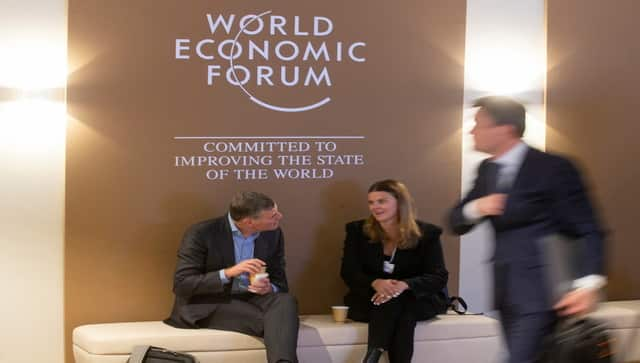Davos. Over the years, the town near Switzerland’s Zurich has become a byword for the world’s elite. Like every year in January, the world’s rich and powerful are set to converge on the town for the annual meeting of the World Economic Forum (WEF). The meeting will take place from 15 to 19 January. The 2023 WEF meet occurred after a two-year break mandated by the COVID-19 pandemic. It witnessed over 2,700 leaders from 130 countries, including 52 heads of state and government, in attendance at the alpine resort town, as per organisers. But what is the WEF? Why does it take place in Davos? Why does it matter? Here’s what you need to know: What is the World Economic Forum? The WEF is a not-for-profit foundation meant to foster global cooperation on political, social, and economic issues.
It was founded by Klaus Schwab, a Swiss-German economist and professor, in 1971
Its website states, “Progress happens by bringing together people from all walks of life who have the drive and the influence to make positive change”. It was initially called the European Management Forum. However, it changed its name to the World Economic Forum in 1987 as it sought to broaden its vision to include providing a platform for resolving international conflicts. As per BBC, the forum is essentially a conference. It comprises speeches and sessions on everything from the outlook for the global economy to how to handle stress. Delegates at the forum are known for networking relentlessly. Bilateral meetings between heads of state and corporate chieftains can be seen occurring in every available space. [caption id=“attachment_13568902” align=“alignnone” width=“640”] Over 100 countries, all major international organisations, the Forum’s 1000 partner companies, civil society leaders, foremost experts, young changemakers, and social entrepreneurs are expected to attend the WEF annual meeting in Davos. Reuters[/caption] McKinsey senior partner Enno de Boer called the meeting “business speed dating on steroids.” Why Davos? The WEF has taken place at Davos – a place known for skiing – since its inception.
Over 100 countries, all major international organisations, the Forum’s 1000 partner companies, civil society leaders, foremost experts, young changemakers, and social entrepreneurs are expected to attend the WEF annual meeting in Davos. Reuters[/caption] McKinsey senior partner Enno de Boer called the meeting “business speed dating on steroids.” Why Davos? The WEF has taken place at Davos – a place known for skiing – since its inception.
But the location wasn’t chosen at random.
The organisation says the location is about more than just its spectacular scenery. Davos was the setting for Thomas Mann’s novel The Magic Mountain. The book tells the tale of a young man who goes to Davos to stay at a sanatorium for three weeks and ends up spending seven years. TIME’s 1927 review of the work makes clear why it was an appropriate inspiration for such an event: “In the sanatorium, a high and chilly retreat, the perspective of life changes,” the reviewer opined. “With death for a background, massive and eccentric as the high Alps, the caperings of man seem puny by comparison. The idiotic decadence, the absurdly microscopic preoccupations of humanity are emphasised by their isolation.” Who is coming? What can we expect? The Davos website states, “Over 100 countries, all major international organisations, the Forum’s 1000 partner companies, civil society leaders, foremost experts, young changemakers, and social entrepreneurs are expected to attend the WEF annual meeting in Davos.”
This year’s theme is ‘Rebuilding trust’.
“The programme embodies a ‘back to basics’ spirit of open and constructive dialogue between leaders of government, business and civil society. The goal is to help connect the dots in an increasingly complex environment and provide foresight by introducing the latest advances in science, industry and society,” the website states. It will explore four areas
- Achieving security and cooperation in a fractured world
- Creating growth and jobs for a new era
- Artificial Intelligence as a driving force for the economy and society
- A long-term strategy for climate, nature and energy
Matthew Lane, co-founder and director of cyber security firm XCyber, told Spear’s ‘whilst it is inevitable that Davos 2024 will discuss AI risks, it is likely to focus primarily on the positive benefits the technology can bring.’ Why WEF is criticised? The WEF meet often comes in for criticism. Many claim that attendees are too out-of-touch or profit- or power-hungry to address the needs of common people and the planet. The New York Times economics correspondent Peter Goodman in his book Davos Man highlighted the contradiction of asking billionaires and elites who cause the world’s biggest problems to find ways to solve them. Critics also point out the hypocrisy of having the climate crisis on the meeting’s agenda. This, even as one out of 10 participants in 2022 travelled by private jet to get there.
However, Davos has had some solid accomplishments since its inception.
In 1988, it helped thwart war between Greece and Turkey through the signing of the Davos Declaration. GAVI, the vaccine alliance, was also first launched in 2000 in Davos. With inputs from agencies
)